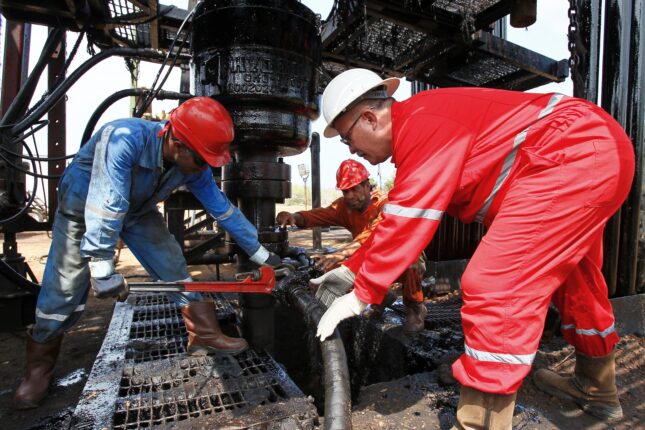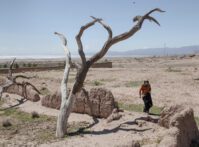-
The Traumas of Unplanned Decarbonization in Fragile States

It is widely recognized that oil states are rarely democratic, and often conflict-prone. As these governments wind down their dependence on this toxic resource as part of broader global efforts to decarbonize, one might imagine that the end of oil will spell a better future for the citizens of oil-producing countries. Sadly, a look at the cases of fragile fossil fuel producing states (FFFPs) suggests that this may not be the case.
A decline in oil revenues shapes governance in FFFPs in particularly problematic ways. These states are least able to plan strategically for the carbon transition. They also usually lack the capacity to cushion the political and economic fallout when hydrocarbon revenues collapse.
This phenomenon has a name: “traumatic decarbonization.” Yet research into it is still in its infancy. So our special issue of the journal Environment and Security on decarbonization and peace examines findings from case studies on Ecuador, Iraq, Nigeria, Sudan, South Sudan, and Venezuela—as well as cross-cutting studies. This new research not only explores what traumatic decarbonization may mean, but it also explores avenues for future research.
The Challenge of Unplanned Decarbonization
Decarbonization is a process which entails the replacement of fossil fuels by renewables or “cleaner” forms of energy. It is essential for limiting global warming to 1.5° or 2°C and achieving net zero emissions by 2050.
Global decarbonization promises to be the most significant political-economic transition of our times. Success will require overcoming the logic of industrial capitalism and global finance and addressing the needs of lower- and middle-income countries so that they don’t have to sacrifice development for climate mitigation.
Decarbonization also entails a collapse in demand for fossil fuels. Notwithstanding periodic spikes, such as those caused the war in Ukraine, oil-producing states will have to contend with falling revenues. Some are planning for this, others are not.
Depending on how one counts, around one-third of the world’s proven oil reserves are located in countries that the World Bank classifies as fragile or experiencing conflict. In most oil-producing nations, oil is central to state finance. But oil revenues also grease politics.
One of the defining features of FFFPs is that political leaders are focused on short-term survival, rather than long-term viability and institution building. Oil money plays a key role in those survival strategies. In fact, peace agreements in conflict-affected FFFPs tend to be structured as elite payouts of oil revenues.
For instance, South Sudanese talk of a ‘payroll peace’, whereby conflict is ended by bringing the fighters from rebel armed groups onto the national payroll, which is premised on a military budget flush with oil funds. One of the papers in the special issue analyses cross-country peace agreement data; it concludes that, in oil producing countries, more comprehensive peace agreements are associated with increasing oil-prices. On the other hand, short-term tactical ceasefires increase when oil prices go down. In other words, political resolution of conflicts is associated with higher oil prices, but when oil prices fall, the short-term management of violence takes precedence.
A significant strand of social science research over the last two decades assumes that fragile states are evolving, albeit at very different speeds, into more institutionalised, stronger, states. An essential finding in our special issue is that the everyday politics of keeping power in FFFPs are not merely background noise to these longer-term processes of state formation. Politics in FFFPs follows alternative logics. Most prominent among these is the logic of the political marketplace: political systems in which allegiances and services are traded for material reward.
Dominating a political market requires control over a national budget that also serves political ends, and in which funds are used—no questions asked—to grease the wheels of a transactional political system. Violence is the other currency in such a political order. Every kleptocracy is entangled with gangsterism. Coercion is implicit in every opaque system of rule, and even emerges as the main tool of governance in moments of crisis.
Oil Price Plunges and Fragility?
Citizens in FFFPs often find that a collapse in state oil revenues manifests itself in an erosion of the supply of public goods that underpins the nation’s social contract. In turn, this can drive popular protests. For ruling elites, however, this revenue crunch is also—first and foremost— a threat to the political funds that sustain their power.
The logic of the political market dictates that ruling elites in a FFFP will try to stay in power using the existing rules of the game. The expectation is that they will protect their political funds and their control over the means of using violence by seeking alternative sources of income, sacrificing public goods, and turning to strategies of outright coercion. They might shrink the size of the governing coalition, and throw less-valued members out into the cold. They also might backpedal on peace processes that require them to bring rebels into the fold.
Our case studies in the new issue of Environment and Security broadly confirm these dismal hypotheses. In almost every case, a collapse in oil revenues sparked a political crisis. Iraq, Nigeria, Sudan and Venezuela all saw large-scale popular protests. Governments managed this unrest through a combination of co-optation and coercion.
At times, however, the tide could not be stemmed. In Sudan, the regime finally fell seven years after losing its oil, when it could no longer provide living wages to urban people. In Nigeria, the government cut health and education budgets in the middle of COVID-19 (which was both a health and a schools emergency)—but also kept line items in the national budget diverted by politicians for discretionary payments constant. In some cases, these figures actually increased.
In countries facing terminal declines in oil income—such as Sudan and Venezuela—ruling elites have aggressively sought out alternative sources of mineral revenues (notably gold) and deepened their criminal networks. Where a hydrocarbon revenue squeeze occurs as a short term or cyclical phenomenon—such as in Iraq or Nigeria—governments have tactically managed short term pressures and then returned to business-as-usual at the first opportunity when oil prices rebounded. South Sudan has done both—and even reverted to pre-oil patterns of accumulation by preying on local communities, occupying their land, and forcibly displacing them.
Finding New and Integrated Approaches
Traumatic decarbonization offers a clear case of research that demands that academics and policymakers break down their silos. Those engaged in conflict resolution or peacebuilding must consider the effects of the global energy transition. Those who work on global climate policies need to understand the fraught politics of FFFPs.
Our new issue offers some suggestions for ways to meet the challenges posed by traumatic decarbonization.
Engagement is essential. International organizations and external mediators need to stay the course in peace processes in FFFPs so that they retain influence, relationships and leverage if decarbonization threatens a peace process. A key is to develop alternate mechanisms that do not rely on elite share-outs of oil revenue. Humanitarian workers should also build decarbonization into their scenario planning for the future.
A move away from global back-casting and toward participatory transition modelling is another crucial step. Back-casting refers to the setting decarbonization aims (such as net-zero by 2050) as a starting point, and then working backwards. Instead, energy transition modelling in FFFPs must account more readily for the logic of political power in those nations. Ensuring that the diverse views of citizens are included within coalitions and planning processes can help hold leaders to account.
Alex de Waal is Executive Director of the World Peace Foundation and a Research Professor at the Fletcher School, Tufts University.
Aditya Sarkar is a Ph.D. Candidate at the Fletcher School, Tufts University, and a Visiting Fellow at the World Peace Foundation.
Sources: Advance; Environment and Security; InSight Crime; OPEC; Small Arms Survey; UK Foreign, Commonwealth & Development Office; UN; USIP; World Bank; World Peace Foundation
Photo credit: Workers from Venezuela’s state-owned oil company (PDVSA) conduct a fracking operation in an oil field, courtesy of JBula_62/Shutterstock.com.
 A Publication of the Stimson Center.
A Publication of the Stimson Center.








